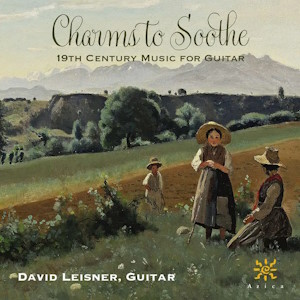
Charms to Soothe – 19th Century Music for Guitar
David Leisner (guitar)
No recording data available
Reviewed as WAV download
Azica ACD-71368 [56]
David Leisner has had a long and illustrious career as a guitarist, organizer, teacher and composer, and now in his early 70s he is still in fine fettle in the first-mentioned capacity, of which this brand new issue is ample proof. The title of the disc implies that this is music very far from the repertoire he has championed for many years: contemporary composers like David Del Tredici, Virgil Thomson, Ned Rorem, Philip Glass, Richard Rodney Bennett, Peter Sculthorpe and Osvaldo Golijov, many of whose works he has premiered, but he has also been a spearhead for reviving more or less forgotten composers from earlier generations. On his debut LP, back in 1979, he featured music by Giuliani and Mertz, whose works since then have become part of the standard repertoire for guitar. Another composer from the same period he has saved from oblivion is Vienna born Leonard Schulz, who spent most of his life in England and was known as “the worst drunkard in London”. Very few of his works have survived, but here three of his etudes have got a new lease of life, together with works by Giuliani and Mertz and other important music from the same era when Leisner returns to his first loves.
This is truly soothing music, melodious, harmonious and loveable, carefree but not toothless. The opening bipartite Nocturne by Mertz begins with a really memorable Andantino, followed by a contrasting lively and enthusiastic Allegro con brio, boiling with energy. The three etudes by Schulz are attractive and sober – the drunkard was obviously in a booze-free period. Fernando Sor was Spanish by birth but left his homeland permanently in 1813 for political reasons and settled in Paris; he also composed etudes that are still reprinted and have taught innumerable promising guitarists their trade. Of the two played here the first, in E Major, is marked “tempo of a religious prayer”, and it certainly has a heavenly aura. Much of Sor’s music otherwise is aimed at virtuosity – he was the most famous guitarist of the 19th century – but here he is in meditative mood.
Giuliani was Sor’s junior by three years and took some time to enter the canon of important guitarist composers, but today he is highly regarded by connoisseurs. He was truly prolific, as the high opus number 148 for his collection Giulianate reveals. In this group of assorted individual pieces, the first is a stand-alone sonata movement, and Leisner has long regretted that Giuliani never amended it to a full-size sonata. Therefore, he took the liberty of picking a lively scherzo, a slow movement and a finale from the same opus, and compiling them in a four-movement sonata, consisting of:
1. La Risoluzione. Melodious, technically fluent
2. Scherzo. Lively, elegant and fresh in ¾-time
3. La Melanconia. Sad, gloomy but beautiful
4. Sentimentale. A lively rondo
This was a brilliant idea. I’m sure Giuliani in his heaven endorses this enterprise.
Two delicate etudes by Regondi follow, before Mertz returns and rounds off this delicious programme with a beautiful Lied ohne Wrote and a jolly and charming Mazurka. Who other than Chopin wrote mazurkas at that time?
This is a disc for anyone, guitar lover or not, with a taste for beautiful and stimulating music in an intimate format, played with taste and devotion.
Göran Forsling
Buying this recording via a link below generates revenue for MWI, which helps the site remain free

Contents
Johann Kasper Mertz (1806-1856)
Nocturne, op. 4, no. 2
Leonard Schulz (1814-1860)
Three Etudes (from op. 40)
2. No. 6, in G major
3. No. 8, in D major
4. No. 9, in A major
Fernando Sor (1778-1839)
Two Etudes
5. op. 31, no. 23, in E major
6. op. 6, no. 11, in e minor
Mauro Giuliani (1781-1829)
Four Pieces (from op. 148)
[in the form of a Sonata]
7. La Risoluzione, no. 1
8. Scherzo, no. 4
9. La Melanconia, no. 7
10. Il Sentimentale, no. 6
Giulio Regondi (1822-1872)
Two Etudes
11. No. 6, in d minor
12. No. 8, in G major
Johann Kaspar Mertz (1806-1856)
Two Pieces (from Bardenklänge, op. 13)
13. Lied ohne Worte, vol. 11, no. 1
14. Mazurka, vol. 11, no. 2

















